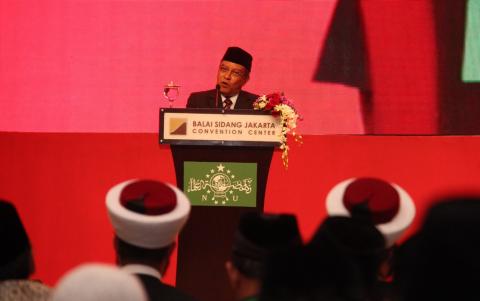NU criticizes pattern of religiousity in Middle East
NU Online · Senin, 9 Mei 2016 | 07:02 WIB
Jakarta, NU Online
General
Chairman of Nahdlatul Ulama (NU) KH Said Aqil Siroj, popularly known as
Kang Said, strongly criticized the pattern of religiosity in the Middle
East for always being trapped into ongoing conflict, saying the main
factor was the absence of a harmonious relationship between nationalism (wathaniyah) and Islam in the region.
He
made the remarks at the International Summit of Islamic Moderate
Leaders (Isomil) in Jakarta Convention Center (JCC), Jakarta, Monday
(9/5), adding that patriotism could unite any different groups whose
religious understanding is different from one another.
Kang Said
also expressed his concerns over the turmoil in the Middle East for
showing civil war cruelly and brutally between fellow Muslims as if
Islam is not a religion of humanity.
"O Arabs, why do you feel
awkward to say that Islam is a religion of humanity? Because in your own
country, there has still been a civil war," he said.
He said
that in most Islamic countries and the Arab there was a polarization
between religion and nationalism so that religious scholars are
generally weak in terms of the spirit of nationalism, adding there had
been many prominent Muslim scholars in the Middle East such as Sayyid
Qutb, Said Hawa, and Hasan al-Banna, but unfortunately they did not have
a strong nationalism. While on the other hand, there had been many
nationalists having no adequate spirit and Islamic insight.
"But
in Indonesia there is (a prominent figure) Shaykh Muhammad Hasyim
Asy'ari. He is pious but is also very nationalistic," he said.
The
man earning his Ph.D degree from the Makkah's Umm al-Qura University
explained the ideas of Hadratussyekh Muhammad Hasyim Asy'ari. The NU's
founder, he said, managed to unite a pluralistic society through the
concept of brotherhood that consists of so-called ukhuwah wathaniyah and ukhuwah basyariyah.
He
said, Hadratus syekh was considered to have been successful in
propagating Islam with a national paradigm in the country that has still
been preserved until now. In the cultural sector, Hadratus syekh
managed ot propagate Islam while respecting the cultural diversity and
local wisdom. Any tradition and systems of belief could be maintained
and preserved as long as it is not opposed to the teachings of Islam.
According
to Kang Said, Indonesia is a concrete example of the true face of Islam
that is capable of dealing with nationalism. Pancasila formulated by
the Muslim majority has become the determining factor of unity in the
island nation comprising some 250 million people.
"Indonesia is not the Islamic state (diniyah) but is the one recognizing religion (mutamaddin)," he said.
Isomil
held on 9 -11 May 2016 was opened by Vice President Jusuf Kalla, on
Monday (9/5). Present at the occasion were General Chairman of Lawmaking
body (Rais Aam) of NU KH Ma'ruf Amin, representatives of the Regional
Board of Nahdlatul Ulama (PWNU) throughout Indonesia, and Muslim
scholars from some 35 countries. (Masdar)
Terpopuler
1
Khutbah Jumat: Maulid Nabi dan 4 Sifat Teladan Rasulullah bagi Para Pemimpin
2
Jadwal Puasa Sunnah Sepanjang Bulan September 2025
3
DPR Jelaskan Alasan RUU Perampasan Aset Masih Perlu Dibahas, Kapan Disahkan?
4
Pengacara dan Keluarga Yakin Arya Daru Meninggal Bukan Bunuh Diri
5
Khutbah Jumat: Menjaga Amanah dan Istiqamah dalam Kehidupan
6
Gus Yahya Ajak Warga NU Baca Istighfar dan Shalawat Bakda Maghrib Malam 12 Rabiul Awal
Terkini
Lihat Semua















